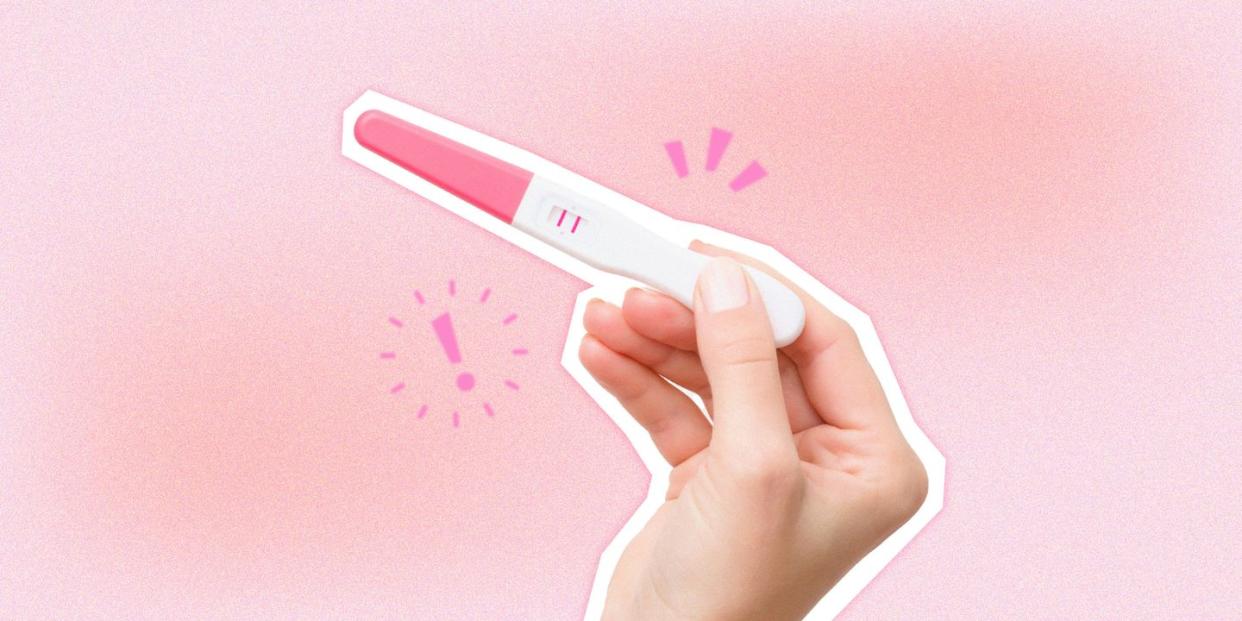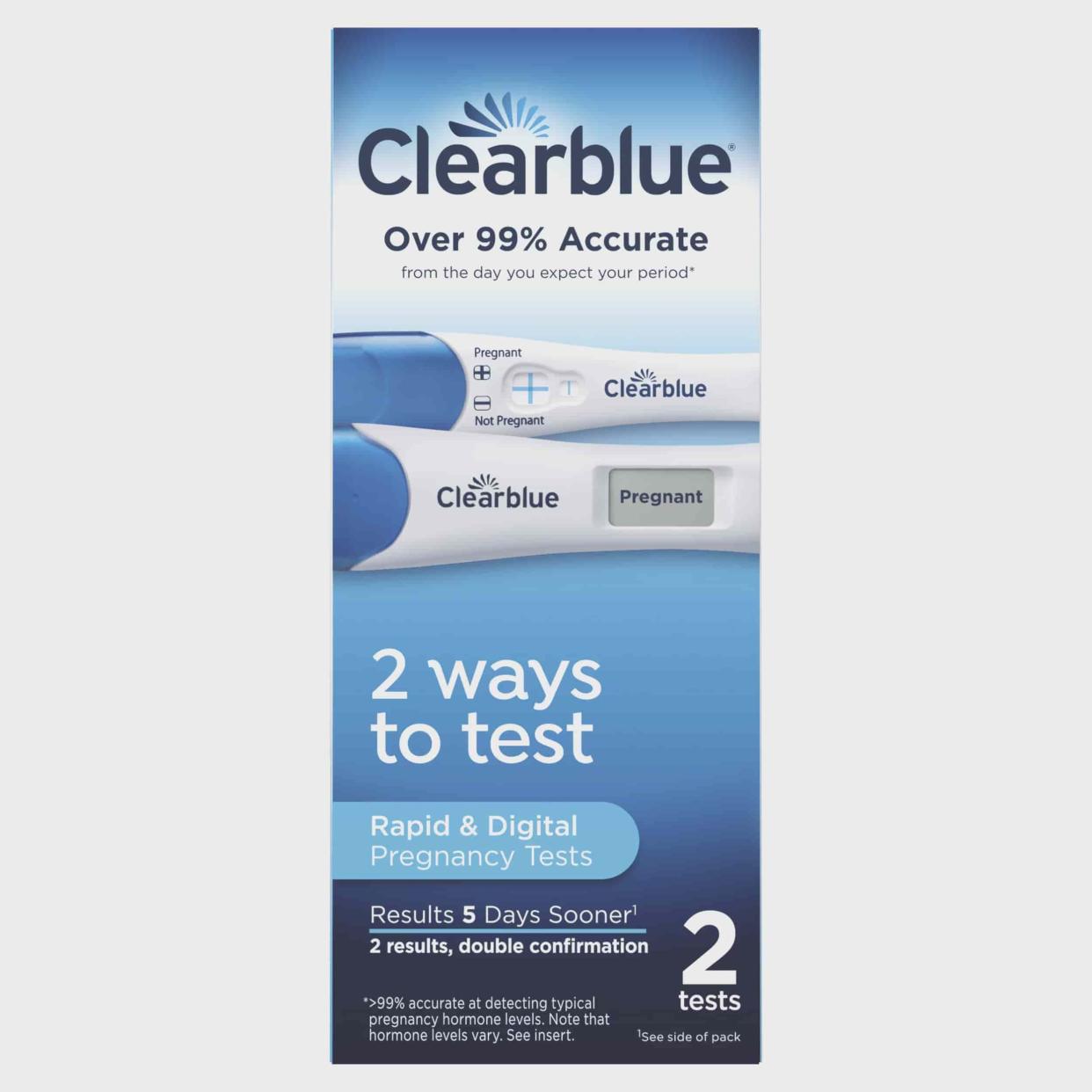How to Deal with a Pregnancy Scare

"Hearst Magazines and Yahoo may earn commission or revenue on some items through these links."
A pregnancy scare can be beyond stressful. Whether your period is super late or you’re not sure if you took emergency contraception in time, waiting to find out if you’re pregnant or not can be so, so scary. But the most important thing to remember is that while there are various resources out there to help you, you’re in control of your body, and any decision concerning it is yours to make. And as reproductive rights hang in the balance in states nationwide due to the overturn of Roe v. Wade, knowing your options when it comes to pregnancy, or possibly terminating a pregnancy, is incredibly important.
Pregnancy scares are fairly common. A 2011 survey done by the National Campaign to Prevent Teen and Unplanned Pregnancy, now called Power to Decide, found that 54 percent of young women surveyed said that they’ve had a pregnancy scare. And according to 2014 study published in the U.S. National Library of Medicine, more than 40 percent of women who reported a pregnancy scare went on to experience an unintended pregnancy.
Seventeen partnered with SexSmarts and the Kaiser Family Foundation to provide information and resources on a range of sexual health issues, including, everything you need to know about dealing with a pregnancy scare.
What are the symptoms of pregnancy?
There’s no immediate signal your body will send if you’re pregnant. Still, there are certain early pregnancy symptoms most people experience, such as a missed period, frequent urination, bloating, nausea, sore or enlarged breasts, and fatigue.
Of course, many of these symptoms can be indicative of other conditions and stresses on your body, so if you wake up feeling extra tired one Monday morning, take a deep breath — it doesn’t necessarily mean you’re pregnant. Anxiety and stress alone can give you some pretty fierce headaches. But still, if you are experiencing some of these symptoms, particularly the missed period, take a pregnancy test or schedule an appointment with your doctor to be sure.
How do pregnancy tests work?
If you are pregnant, your body starts producing a hormone called human chorionic gonadotrophin (HCG), which can be detected in urine and in blood about 10 days after conception, according to the Cleveland Clinic.
Pregnancy tests work by checking for this hormone, which is released after a fertilized egg implants itself in your uterus. Although some pregnancy test brands claim to detect pregnancy even before your missed period, it’s recommended to wait until at least one day after your missed period, per the Mayo Clinic. That way, you’re more likely to get more accurate results.
Where can I get a pregnancy test?
You can buy at-home pregnancy tests in most drugstores and supermarkets. Just be sure to follow the manufacturer’s directions — and check expiration dates — very carefully to get accurate results. If you’d prefer to have the test administered by your healthcare provider, or you’d like to get the results of your home test confirmed, you can see your doctor or call Planned Parenthood for a test. To find the Planned Parenthood Clinic nearest you, call their hotline at 1-800-230-7526 or visit their website.

Combo Pregnancy Test
$9.94
walmart.com
What if the pregnancy test result is positive?
Getting back a positive result on a pregnancy test can be a pretty emotional moment, so it’s okay if it takes you a few hours or days to figure out how you really feel about it. One of the best ways to deal with your possible anxiety and confusion is to talk about how you’re feeling with someone you trust, someone who will support you and listen to your concerns with a generous and open mind.
While it can be comforting to turn to your closest friends, it’s also really important to confide in a trusted adult, too. Try talking to a parent, relative, friend’s parent, counselor, or doctor. A supportive adult will be able to help you understand the medical choices you have in front of you, as well as the options you have to consider — having the baby, having an abortion, or giving birth and placing the baby up for adoption. To ensure that you feel safe and protected, you might ask the person (or people) to keep your news confidential.
If you want an additional well-informed person to talk to, consider consulting with a trained counselor at a family planning clinic. They will be able to talk to you in confidence about your feelings, options, and the decisions you need to make. You can be referred to a family planning clinic by calling the Planned Parenthood hotline.
How do I prevent pregnancy scares in the future?
If you are sexually active, using a reliable method of birth control — or even better, combining a few reliable methods, like condoms and the birth control pill — is the best way to avoid an unplanned pregnancy.
Condoms are a great source of protection because they’re inexpensive, easy to find, have high rates of success, and guard against sexually transmitted infections. If you learn how to use condoms and get in the habit of carrying them with you just in case, you’ll always have a protection plan in place.
Birth control pills are another highly dependable method of protection against pregnancy, as long as you’re consistent about taking them in a regular manner, once a day. You might also consider other forms of birth control, such as an IUD or implant like Nexplanon. These all require a visit to your OB/GYN or healthcare provider, so make sure to call and schedule an appointment if you think one of these methods is best for you.
Another option is to abstain from sex, meaning you don’t have sex at all. Or, you and your partner might only engage in outercourse, which is a way to be sexually active without penetration or having vaginal sex.
Should I take the morning after pill?
If a condom breaks or you forgot to take your pill a few times this month, you can take emergency contraception. In most cases, if taken within 72 hours, certain emergency contraceptive pills can help to reduce the risk of pregnancy by up to 89 percent.
There are a few types of emergency contraception available today — Plan B, Ella, and a copper IUD. Plan B is available over the counter, while Ella requires a prescription. A copper IUD can also act as an emergency contraceptive and doubles as a long-acting form of birth control. To act as an emergency contraceptive, the IUD must be inserted within five days of unprotected sex.
A new form of emergency contraception, Julie, is FDA-approved, and like Plan B, contains the hormone levonorgestrel (which prevents pregnancy). It’s an over-the-counter pill available exclusively at Walmart and doesn’t require an ID or prescription for purchase.
Emergency contraception works by inhibiting or delaying ovulation, preventing fertilization, or preventing implantation of a fertilized egg. Unlike mifepristone (a medical abortion drug), emergency contraception does not interrupt or terminate an established pregnancy; it prevents pregnancy from occurring. That means if you are already pregnant, it won’t work.
Emergency contraception can cause nausea for a day or so, but you can ask your provider to prescribe an anti-nausea medication. It’s also not foolproof — it only reduces your chance of pregnancy by 75 to 89 percent.
Keep in mind, emergency contraception is for emergencies. In other words, it is not a reliable long-term birth control method and it does not protect against STIs, before or after its use. It also does not protect against future acts of intercourse, so it is important that you use another form of birth control if you have sex again.
How much do emergency contraceptives cost?
Generally, emergency contraception pills such as Plan B and Julie (which, remember, are over the counter) typically cost between $30 and $50 at local pharmacies and retailers such as Amazon, Walmart, and Target. Costs can be less — or even nonexistent — at family planning clinics and health centers. Copper IUDs are more expensive. These can range between $0 and $1,500, depending on your insurance plan, as they must be inserted by a doctor. Find out everything you need to know about emergency contraception here.
You Might Also Like
